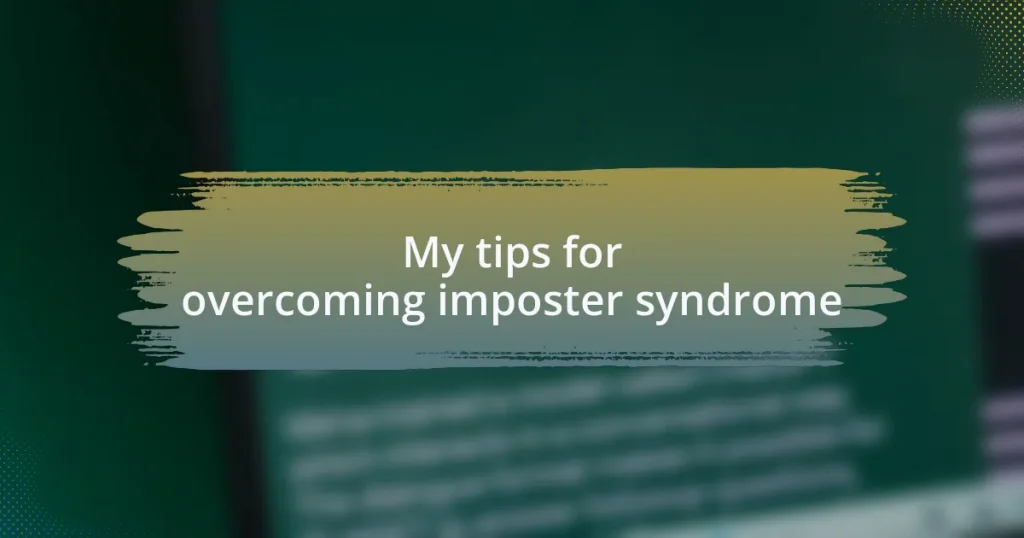Key takeaways:
- Imposter syndrome is a common experience, particularly among high achievers, characterized by feelings of self-doubt and inadequacy despite evidence of success.
- Key causes include perfectionism, fear of being exposed as a fraud, and social comparisons, leading to a cycle of self-criticism and validation seeking.
- Strategies to combat imposter syndrome include open dialogue with peers, practicing self-compassion, setting realistic goals, and celebrating small achievements.
- Building confidence involves recognizing progress, engaging in meaningful projects, and seeking constructive feedback to understand strengths and weaknesses.
Author: Charlotte Everly
Bio: Charlotte Everly is an accomplished author known for her evocative storytelling and richly drawn characters. With a background in literature and creative writing, she weaves tales that explore the complexities of human relationships and the beauty of everyday life. Charlotte’s debut novel was met with critical acclaim, earning her a dedicated readership and multiple awards. When she isn’t penning her next bestseller, she enjoys hiking in the mountains and sipping coffee at her local café. She resides in Seattle with her two rescue dogs, Bella and Max.
Understanding imposter syndrome
Imposter syndrome is that nagging feeling that you’re not as competent or skilled as others perceive you to be. I remember a project early in my career where I led a team on a significant web development initiative. Despite receiving praise for our results, I couldn’t shake the idea that I had somehow tricked everyone into thinking I was capable. Have you ever felt that disconnect between your abilities and how others view you? It’s unsettling.
This phenomenon often strikes high achievers, making them feel unworthy of their accomplishments. I recall a time when I was invited to speak at a conference, and my first instinct was to think, “What do I know that others don’t?” Such thoughts can cloud your confidence and fuel self-doubt, even when evidence of your success is right in front of you. It’s a strange contradiction, isn’t it?
Understanding imposter syndrome involves recognizing that it’s a common experience, not a reflection of your actual skill set. For many, it’s a cycle bordering on perfectionism and self-criticism, leading to a never-ending quest for validation. When I began to openly discuss these feelings, I learned that many peers shared similar experiences. What if, instead of seeing self-doubt as a flaw, we viewed it as a part of our growth journey?
Causes of imposter syndrome
When I reflect on the causes of imposter syndrome, it becomes clear that perfectionism plays a significant role. There was a period when I spent hours perfecting every line of code, agonizing over every small detail. It’s fascinating how this deep-rooted need to achieve flawlessness can create an impossible standard, leaving us feeling inadequate when we inevitably fall short. Have you ever held yourself to such high expectations that anything less than perfect felt like failure?
Another underlying cause is the fear of being exposed as a “fraud.” I recall a scenario where I was part of a web development team that was recognized for its innovative project. Even as accolades poured in, I couldn’t shake the notion that if anyone delved deeper into my work, they’d discover how little I truly knew. Isn’t it interesting how success can trigger that fear rather than diminish it?
Social comparisons can also exacerbate these feelings. I often find myself scrolling through social media, seeing fellow developers showcase their latest projects. It’s easy to fall into the trap of comparing their highlights with my behind-the-scenes struggles. This comparison feeds a narrative that I’m not doing enough, doesn’t it? Recognizing these causes has been essential in my journey to overcome these feelings and embrace my growth more genuinely.
Recognizing symptoms of imposter syndrome
When I first started noticing signs of imposter syndrome, I often felt a wave of self-doubt wash over me, especially after receiving compliments about my work. It was as if I couldn’t internalize the praise; I’d immediately think, “They must not know about the mistakes I made along the way.” This disconnect between external validation and internal belief can be a telltale sign of imposter syndrome.
Another symptom that crept into my daily routine was the habit of downplaying my achievements. I remember completing a challenging web project and mentioning it casually in conversation, almost as if I was apologizing for doing well. I often pondered, “Why do I find it so hard to celebrate my success?” This reluctance to acknowledge my accomplishments can be a frustrating aspect of the syndrome, leaving me feeling more like a bystander in my own career.
Lastly, the constant pressure to prove myself was exhausting. There were countless nights I spent perfecting minor details, fueled by an irrational fear that one misstep could expose my “fraudulence.” Have you ever felt that relentless chase for validation, only to realize it’s often an uphill battle? Recognizing these symptoms in myself has helped me understand the importance of self-compassion and acceptance in my journey as a developer.
Strategies to combat imposter syndrome
One effective strategy I’ve found to combat imposter syndrome is open dialogue with others. Recently, I shared my feelings of inadequacy with a few fellow developers, and to my surprise, many of them echoed my experiences. It was eye-opening to realize I wasn’t alone in these feelings. Have you ever considered how sharing your thoughts could foster a sense of community and support?
Practicing self-compassion is another powerful tool in my toolkit. After a particularly tough project, instead of being my own worst critic, I learned to treat myself with kindness, just as I would for a friend facing similar struggles. I often remind myself that nobody is perfect and that it’s okay to make mistakes; they’re often my best teachers. Isn’t it refreshing to consider that growth often comes from discomfort?
Setting realistic goals has also played a crucial role in managing my self-doubt. At the beginning of a project, I used to overwhelm myself with lofty expectations. Now, I break tasks into smaller, manageable steps, celebrating each accomplishment along the way. This shift in mindset not only keeps me motivated but also allows me to enjoy the process more. Have you ever thought about how smaller victories can lead to greater confidence?
Building confidence in skills
Building confidence in skills is often about recognizing and celebrating progress, no matter how small. I remember when I first learned to code a dynamic web application. Initially, I was overwhelmed by the complexity, but each challenge I overcame built not only my skills but also my self-esteem. I started to see each line of code I wrote as a step in my journey, fostering a sense of accomplishment. Have you taken a moment to reflect on your progress recently?
Another way I’ve found to boost my confidence is by developing a personal project that excites me. A few months back, I began creating a website for a local non-profit. The passion I had for the cause pushed me to learn new frameworks and techniques. Engaging in something meaningful not only sharpened my technical skills but also reminded me of my value as a developer. Have you tried aligning your work with your interests to bolster your confidence?
Lastly, seeking feedback has been invaluable in my journey. I once hesitated to share my work for fear of criticism, but I made a conscious effort to invite constructive feedback from my peers. This not only provided me with valuable insights but also highlighted the areas where I excelled. By understanding my strengths and addressing my weaknesses in a positive context, I gradually learned to trust in my abilities. How often do you use feedback to gauge your growth?
Seeking support from peers
Reaching out to peers can be a game changer when battling imposter syndrome. I recall a time when I was stuck on a complex coding problem and felt completely isolated. I decided to share my struggle in a developer forum, and the supportive responses I received truly uplifted my spirits. It made me realize that others had faced similar hurdles and overcame them, which reassured me that I was not alone in my journey.
Collaboration can also give you a fresh perspective on your abilities. I remember working on a team project, where I was tasked with a component I initially thought was out of my league. When my teammates provided encouragement and shared their insights, I began to see the value in my contributions. Have you thought about how collaboration could enhance not only your skills but also your confidence?
Creating a support network with like-minded individuals has enriched my growth immensely. After joining a local meet-up group, I found myself participating in discussions filled with both challenges and triumphs. This sense of belonging boosted my confidence and motivated me to push through doubts. Have you considered finding your own community to share your experiences and learn from others?
Sharing experiences with others
Sharing experiences with others can be incredibly powerful. I vividly remember a time at a coding boot camp when I hesitated to speak up about my fears of not being good enough. But when I heard my peers share their own insecurities, it struck a chord with me. Suddenly, I felt more connected; it was a shared vulnerability that bridged the gap between us. Have you ever noticed how revealing our struggles can create a supportive atmosphere where everyone feels safe to express themselves?
I recently joined an online community where we openly discuss the challenges of web development. During one chat, a member shared their journey of overcoming feelings of inadequacy after receiving harsh feedback on their project. Listening to their story reminded me of my own experiences, and it became clear that learning from one another fosters growth. Do you think having an open dialogue about these feelings could help lessen the weight of imposter syndrome?
Participating in workshops has also been a game changer for me. I vividly recall a session where attendees shared their breakthroughs and setbacks. Hearing the varied paths of fellow developers, I felt a sense of camaraderie. This collective storytelling reassured me that everyone has their personal journey, and that’s what makes us all unique. Have you reflected on how sharing your own narrative could inspire others along their paths?















